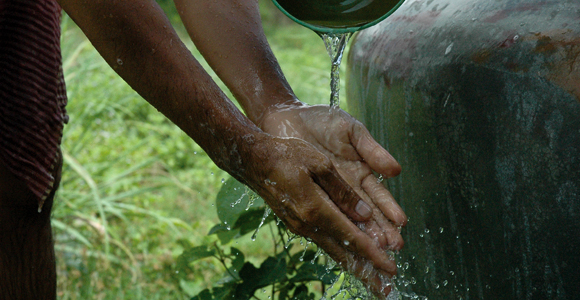
Community Health Output-Based Aid (CHOBA)
CHOBA is a project aimed to significantly increase sanitation practices and hygiene behavior change among poor rural households. Founded on an output-based aid approach, CHOBA follows a new funding mechanism to improve performance and service delivery to the poor. Output-based aid ensures personal responsibility for sanitation through conditional rebates, only awarded when installation and utilization of latrines have been verified. The output-based aid approach also extends to the implementing entity, RACHA, in which the organization receives funds per household reached and verified. With a systematic structure of funding, CHOBA creates accountability for increased sanitation and hygiene behavior change both in the community and at the organizational level.
More specifically, RACHA plans to target 17 communes in Pursat Province to achieve at least 30% increase in sanitation coverage and achieve healthful hygiene behavior change in hand washing with soap. With active participation and collaboration with local authorities, RACHA will target households classified as the poorest in the community to ensure that the increased development in sanitation adoption does not fall short among the demographic most in need. Moreover, targeting impoverished households is a strategy to create motivation among more affluent households to pursue improved sanitation practices. RACHA, along with East Meets West, aims to help rural communities achieve an open defecation free (ODF) status in a sustainable matter, thereby improving living conditions and combating sanitation-related health problems. CHOBA integrates the output-based aid scheme into community hygiene and sanitation implementation to ensure effective increased sanitation adoption and hygiene behavior change.
Hygienic Septic Digestion Latrines
Families who live in floating villages or very near contaminated water sources are constantly at risk from waterborne diseases due to the lack of sanitation facilities. To address this specific issue, RACHA has designed, developed, and initiated a novel technology in two floating communities and in four land-based communities, the Biotech Septic Tank Digester. RACHA renovates latrines in health centers where, in the past, unhygienic and poorly functioning latrines have led to inadequate waste management. In an environment where high floods are common and sanitation facilities are scarce or even nonexistent, the hygienic latrine is an innovative approach to provide a necessity in difficult surroundings. This hygienic latrine uses enzymes to digest the waste products into ecofriendly byproducts. Besides being a safer option, the latrine is user friendly in that it does not require frequent pump outs, and has a very low odor.RACHA is working diligently to highlight its effectiveness and impact on the community.
Hygiene Behavior Change: Hand Washing and Soap Production
In order to instill sustainable water, sanitation, and hygiene practices in communities, RACHA works intensively in the community at the grassroots level to promote and educate families. Through the large network of community health workers and health facility staff, RACHA hosts health promotion contests, health education sessions, and hygiene behavior activities. RACHA trains and supports local volunteers to promote, mobilize and educate communities focusing on fundamental health behavior changes, such as hand washing at critical times, waste management, and hygienic food preparation. RACHA also supports these activities through local production of antibacterial soaps for communities.

 : +855 23 213 724 | +855 23 726 257
: +855 23 213 724 | +855 23 726 257 : office@racha.org.kh
: office@racha.org.kh













